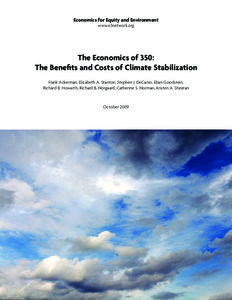The economics of 350: the benefits and costs of climate stabilization
"Stopping global warming and protecting the earth's climate is a daunting challenge. To prevent a climate crisis we have to move quickly to transform the ways in which we create and use energy, develop petroleum-free transportation, and much more. These changes will not be free; there is a...
| Main Authors: | , , , , , , , |
|---|---|
| Institution: | ETUI-European Trade Union Institute |
| Format: | TEXT |
| Language: | English |
| Published: |
Portland, OR
2009
Economics for Equity and the Environment Network |
| Subjects: | |
| Online Access: | https://www.labourline.org/KENTIKA-19187029124919052019-The-economics-of-350-the-benef.htm |
| Summary: | "Stopping global warming and protecting the earth's climate is a daunting challenge. To prevent a climate crisis we have to move quickly to transform the ways in which we create and use energy, develop petroleum-free transportation, and much more. These changes will not be free; there is already resistance to paying for the first steps along this road. Some think that reaching for more ambitious mitigation targets, and quicker reductions in emissions, would mean economic disaster. Some economists have become known for advocating only slow and modest responses to climate change, lest the costs of mitigation become too large.
This report demonstrates that the 'go slow' recommendations are unjustified. A number of economic analyses, informed by recent scientific findings and using reasonable assumptions, suggest that more ambitious targets and quicker action make good economic sense. The warnings about climate change are growing steadily more ominous - but it has not, as a consequence, become impossibly expensive to save the planet. We can still afford a sustainable future." |
|---|---|
| Physical Description: | 50 p. Paper Digital |

